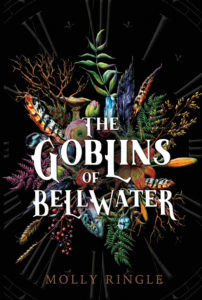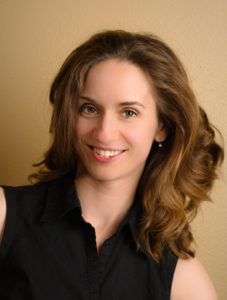I am beyond thrilled to be able to host a Q& A with Molly Ringle. As you know, I LOVED Goblins of Bellwater for its ability to balance the original tale with the modern world. Being a huge fan of The Goblin Market poem, this was a must read for me and should be for anyone else who loves that! Which is a great place to start with the questions!
 How closely did you follow Christina Rossetti’s poem “Goblin Market” as a basis for the story?
How closely did you follow Christina Rossetti’s poem “Goblin Market” as a basis for the story?
I call this a book “inspired by” Rossetti’s poem rather than saying it’s “based upon” it, because I did veer from the poem a significant amount. I first read the poem a few years ago, and it intrigued me deeply. It’s evocative and strange, and, like a fairy tale, has many symbols and events that could be interpreted as having several different meanings. My assignment to myself was to use it as a jumping-off point for a modern paranormal novel, which would then go its own way as the plot required. What I kept from the poem was the basic surface framework: we have a pair of sisters, grown but on the young side, one of whom becomes enchanted by eating goblin fruit in the forest and begins wasting away as a result, alarming the other sister into seeking a way to save her.
Since Rossetti’s poem ends with a fast-forward to the women being “wives” and telling their children about their adventures, and since I wanted to write a paranormal romance anyway, I gave my modern sister characters a pair of men to get involved with, in a double love story with eerie angles that I think match the eeriness of the original poem. Mind you, another interpretation of the poem is that the two women aren’t really sisters but lovers, which would be a different route to take and which I think would be lovely to see too!
Why do you think fairy tale and other myth and legend retellings are so popular right now?
I think they’ve always been popular! Maybe it’s a case of selection bias, because I personally have always been into ghost stories, fairy tales, and other supernatural lore, but it seems to me that human culture has never stopped telling such stories. As scholars of fairy tales will tell you, reading and writing about fantasy and the paranormal may look like escapism from reality, and sometimes I tell myself that’s what I’m doing, but in truth these stories end up giving us all the useful lessons about real life that any good stories do: empathy, courage, love, respect for nature and community, and the importance of thinking fancifully and creatively.
What are the goblins like in this book?
In keeping with both the “Goblin Market” poem and the bulk of faery lore, they are mischievous and villainous. They laugh a lot, but they are decidedly laughing at you, not with you. They steal, and in particular they lust after gold. Like other fae, they enjoy making deals with humans, but humans would be wise not to enter into such deals, as the obligation tends to be heavier than it sounds at the outset. These goblins go further than merely theft, too; they assault and sometimes steal away humans and turn them into fellow goblins, and at other times enchant them into wandering unhappily in the woods until they waste away and die.
Although the goblins are sometimes amusing in their level of witty rudeness, they are nearly all amoral and highly dangerous to get involved with. Only a scant few of them, who were once humans, manage to retain any human empathy. However, not all of the fae in my book are this cruel—the goblins are the worst of the lot! Others are willing to be quite helpful to humans as long as they are respected in return.
About Writing in General
 What do you find most challenging in writing a novel?
What do you find most challenging in writing a novel?
At first, it’s usually getting to know the characters. I tend to start with a general idea of who they are, but then when I begin writing, I realize there’s too much I still don’t know about these people and therefore they aren’t coming across as real yet. It slows me down in the early stages while I take breaks to write notes in which I interview them and figure them out. I also have a perennial problem with writing antagonists.
They have to do fairly awful things (being antagonists and all), but I still want them to feel like real people (or other beings), and therefore I have to get into their heads and figure out why they would feel justified in doing such a thing. It’s not a comfortable place for my mind to go. I suppose that’s why I gravitate more toward romance and lightheartedness: I much prefer spending time with those who love and laugh.
What are the easiest parts of writing a novel for you?
No part of the process is exactly easy. But sometimes lines will occur to me seemingly out of nowhere when I’m writing, and they’re perfect for the moment; or I’ll find my characters talking to each other in my head when I’m not writing. And I love those moments, because for them to have come to life in my imagination like that, it means I must have done sufficient groundwork in figuring out the world and the characters. So although the groundwork is the hard part, it pays off and leads to easier parts later!
How did the writing of this novel, a fairly short stand-alone paranormal, compare to the writing of the Persephone trilogy?
It was far simpler! The Persephone’s Orchard trilogy had dual timelines, for one thing: the ancient world in Greece, and the reincarnations of those people in the modern day. For another thing, it had far more characters, both in original and reincarnated versions. And for any series, you need to have plot arcs that stretch over the whole series as well as smaller ones that get wrapped up within each volume; and you have to keep the whole thing internally consistent in terms of mood and themes and character personalities.
It turned out exhausting enough that I didn’t want to write another series again anytime soon. So I picked The Goblins of Bellwater as my follow-up project: small cast, straightforward plot, and simple timeline. Most of the action takes place within about six weeks, in this small town, which is indeed a contrast to the millennia of world-spanning events covered in the trilogy!
Fun Questions!
Would you want to live in any of the fictional magical worlds you’ve created?
Strange though it might sound, I’d love to visit the Underworld as I wrote it in Persephone’s Orchard and its sequels. I made it much less scary, for the most part, than it is in traditional Greek mythology; and besides that, I love caves and glowing things, and definitely would be interested in a ride on a ghost horse as long as an immortal was keeping me safe during it. As for the fae realm we see in The Goblins of Bellwater, I’d like to catch glimpses of it, and of the fae themselves, but I wouldn’t want to actually enter the realm. Too perilous!
What are you writing next?
One of the genres I love, and haven’t written enough of myself, is male/male love stories, so I’ve been working on a couple of those. One is contemporary, no magic or supernatural stuff, and it’s undergoing the feedback-and-revision stage right now. Another will involve a fae realm like that of The Goblins of Bellwater, only in a new location in the world, a fictional setting I’m creating. I still have to figure out how this place works and what its magic system is like, in addition to getting to know the characters, but I’m excited about the idea and it has definitely taken root in my brain.
The Goblins of Bellwater
Make sure you read my review and then go and buy yourself a copy of this fantastical book!
Amazon
Barnes & Noble
Google Play
Kobo
Discussion
Who would you love to interview?
Subscribe for more bonus content like this
Nice interview!
Thanks!!